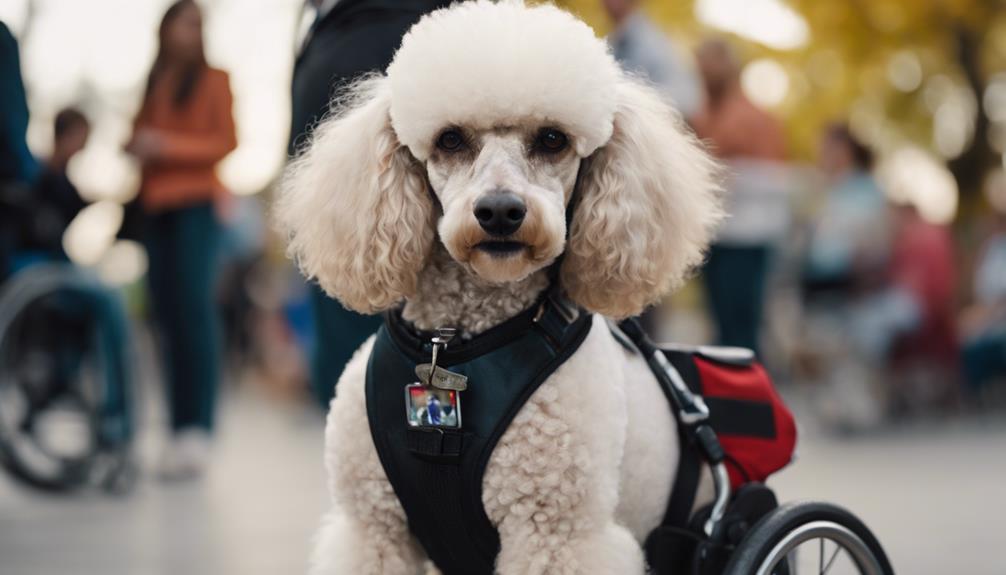You've probably heard the saying, "A dog is the only thing on earth that loves you more than you love yourself." When it comes to Poodles as therapy and service dogs, this sentiment couldn't ring truer. The roles these intelligent and compassionate creatures play in enhancing the lives of individuals in need are remarkable. But have you ever wondered about the specific training methods and skills required for Poodles to excel in their roles as therapy and service dogs?
Key Takeaways
- Poodles excel in therapy and service roles due to their versatility and intelligence.
- Extensive training and certifications enhance poodles' performance in these roles.
- Poodles offer emotional support, reduce anxiety, and boost morale effectively.
- Their hypoallergenic coat makes them suitable for individuals with allergies in therapy and service settings.
Poodles: History and Origins

The history and origins of poodles can be traced back to their beginnings in Germany as skilled duck hunters, evolving into the national dog of France known for their versatility and intelligence. Bred initially for water retrieval, poodles quickly demonstrated their adaptability and trainability, making them excellent candidates for a variety of roles, including service and therapy work. Their keen intelligence and hypoallergenic coat further enhance their suitability for these specialized tasks. Poodles excel in providing emotional support to individuals in need, offering companionship and a calming presence as therapy dogs. In the realm of service, their problem-solving abilities and eagerness to please enable them to assist individuals with disabilities in various daily tasks.
Through centuries of development and refinement, poodles have solidified their reputation as not only beloved companions but also as invaluable partners in service and therapy work. Their rich history as working dogs underscores their innate desire to serve and their capacity to make a meaningful impact in the lives of those they assist.
Physical Characteristics of Poodles

Poodles exhibit distinct physical characteristics that vary across the three size categories of Standard, Miniature, and Toy, each possessing unique traits that contribute to their overall appeal and functionality. Standard Poodles are medium-sized, while Toy Poodles are small, and Miniature Poodles are extra small. One of the most striking features of Poodles is their curly, dense, and low-shedding coat, which is considered hypoallergenic. This coat requires regular grooming every 6-8 weeks to maintain its quality and prevent matting. Poodles are known for their elegant appearance and distinctive curly coat texture.
| Characteristic | Standard Poodle | Miniature Poodle | Toy Poodle |
|---|---|---|---|
| Size | Medium | Small | Extra Small |
| Coat Texture | Curly, dense | Curly, dense | Curly, dense |
| Grooming Needs | Regular grooming | Regular grooming | Regular grooming |
Poodle Temperament and Behavior
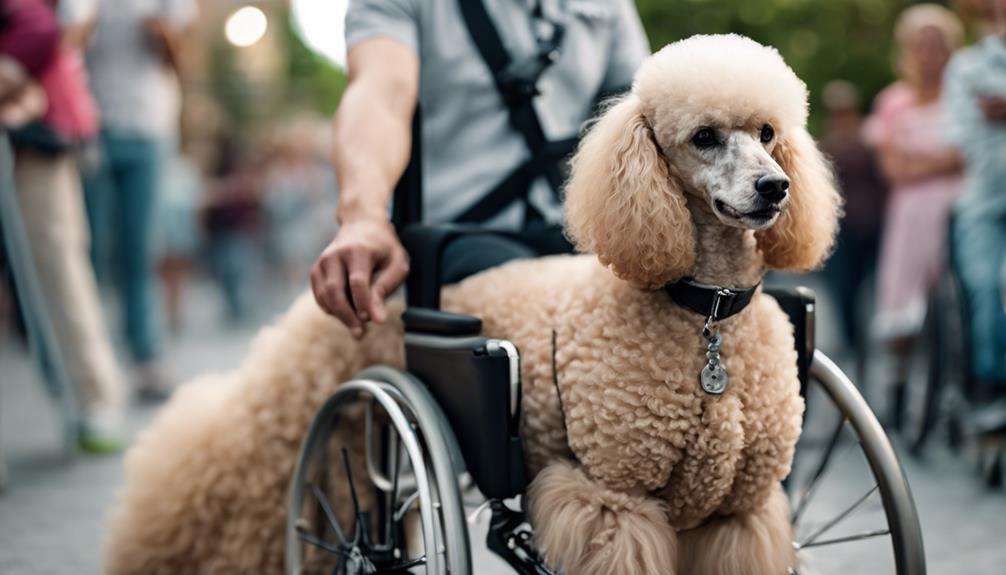
Poodles' sociable nature makes them ideal for therapy work, as they naturally seek human interaction and connection. Their high intelligence demands consistent behavioral training to channel their abilities effectively. The poodle's friendly temperament and adaptability create a strong foundation for successful therapy interactions.
Poodle Sociability Traits
With a reputation for their friendly and people-oriented nature, poodles demonstrate exceptional sociability and adaptability across various environments. Their alertness and loyalty enable them to form strong bonds with their owners, essential for providing support in therapy work. Poodles rank high in friendliness, a key trait for roles involving interaction with people, such as therapy settings. Their intelligence and instinctual behavior allow them to excel in tasks requiring empathy, making them valuable companions during therapeutic interventions. Poodles' social and empathetic traits make them well-suited for service work, where they can offer emotional support and aid to individuals in need. These inherent sociability characteristics contribute to their effectiveness as therapy and service dogs, enhancing the lives of those they assist.
Behavioral Training Needs
To effectively train poodles for service or therapy roles, it is essential to implement consistent positive reinforcement methods that focus on building confidence and reducing anxiety. Poodles' intelligence and sensitivity require tailored training approaches to bring out their best qualities. Socialization from an early age is crucial for poodles to adapt well to various environments and tasks. When training poodles, clear communication and establishing trust are key elements in enhancing their performance as service or therapy dogs. By focusing on positive reinforcement, confidence-building, and anxiety reduction, poodles can develop the necessary skills to excel in their roles, showcasing their intelligence and adaptability through well-rounded behavioral training.
Temperament for Therapy
Their friendly and people-oriented nature, combined with their empathetic behavior, makes poodles ideal candidates for providing therapy support to individuals in need. Poodles' ability to connect with people on an emotional level and offer comfort plays a crucial role in their effectiveness as therapy dogs. Their loyal and alert demeanor allows them to sense and respond to the emotional needs of those seeking support, making them valuable companions in therapy settings. Additionally, poodles' intelligence and sensitivity to human emotions enable them to adapt well to various environments, ensuring they can provide emotional support in diverse situations. Through their calming presence and empathetic gestures, such as offering comfort and reassurance, poodles excel in offering therapy support to individuals experiencing distress.
Poodles as Service Dogs
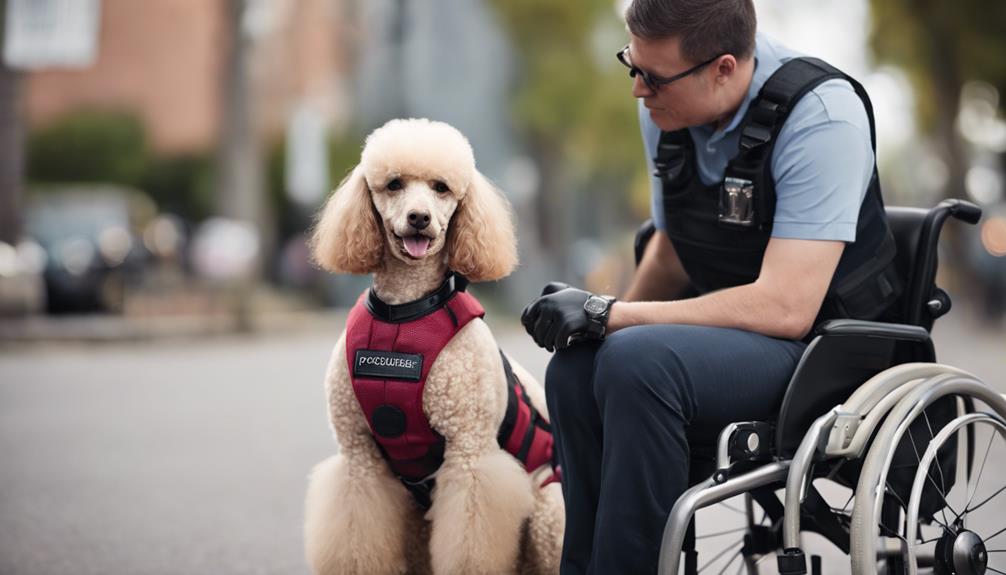
Standard Poodles, renowned for their intelligence and hypoallergenic coat, stand out as one of the top three breeds for service work due to their exceptional capabilities. When considering Poodles as service dogs, it is crucial to understand their unique characteristics that make them well-suited for this role:
- Versatile in Size: Poodles come in different sizes, offering flexibility for various service tasks.
- 'Poodle Focus': Their ability to intensely focus on tasks can be advantageous for service work.
- Scent Training Proficiency: Poodles excel in scent training, making them suitable for tasks like diabetic alerting.
Poodles, with their high intelligence and adaptability, are particularly adept at tasks such as scent training, alerting for medical conditions, and providing light mobility assistance. However, their grooming needs, including regular maintenance and associated costs, should be factored in when considering them for service work. Overall, Poodles bring a unique set of skills and traits that can greatly benefit individuals in need of service assistance.
Poodles as Therapy Dogs
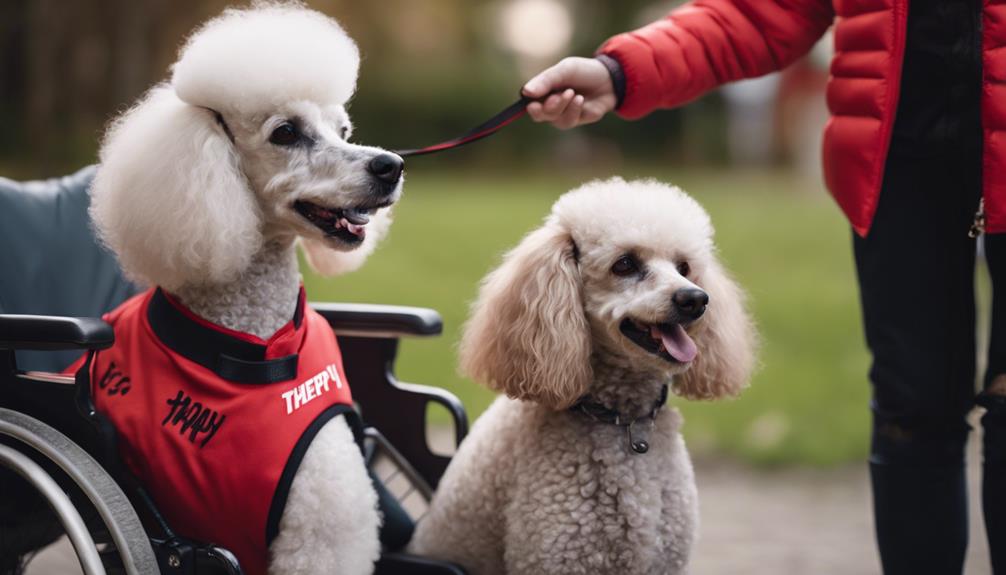
Poodles' calming presence plays a vital role in their effectiveness as therapy dogs, offering comfort and reassurance to those in distress. Their therapy work benefits not only patients but also healthcare professionals, enhancing the overall emotional well-being within healthcare settings. Through bonding with patients, therapy poodles create a unique connection that promotes healing and positivity in challenging circumstances.
Poodles' Calming Presence
With their calm demeanor and affectionate nature, poodles demonstrate exceptional potential as therapy dogs, providing comfort and emotional support to individuals in various settings. Poodles excel in offering emotional aid due to their empathetic nature and soothing presence. Here are some ways poodles' calming presence benefits individuals in need:
- Easing Anxiety: Poodles have a gentle demeanor that helps reduce anxiety levels in those they interact with.
- Providing Comfort: Their affectionate nature offers solace to individuals experiencing distress or loneliness.
- Promoting Relaxation: Poodles' intuitive ability to sense emotions allows them to engage in behavior that promotes relaxation and a sense of well-being.
Therapy Work Benefits
Poodles contribute significantly to therapy work by offering emotional support and comfort to individuals facing various challenges in environments such as hospitals, nursing homes, and schools. Their friendly and gentle nature makes them ideal for reducing stress and anxiety, benefiting people of all ages. Here is a table highlighting the therapy work benefits of Poodles:
| Therapy Work Benefits | Emotional Support |
|---|---|
| Reduce stress and anxiety | ✔ |
| Boost morale | ✔ |
| Aid in social interactions | ✔ |
| Improve overall well-being | ✔ |
Poodles excel in providing unconditional love, companionship, and a calming presence, enhancing the emotional support they offer. Through specialized training, they develop empathy, active listening skills, and adaptability, ensuring effective therapeutic outcomes in diverse settings.
Bonding With Patients
Forming deep connections with patients in healthcare settings, therapy dogs like Poodles demonstrate their exceptional ability to provide comfort and emotional support. Poodles, as therapy dogs, excel in establishing meaningful relationships with individuals in need through their affectionate and empathetic nature. They offer a calming presence and companionship, showing remarkable sensitivity to the emotional needs of patients. This unique bond helps reduce stress, promote well-being, and enhance the overall quality of care provided. The intuitive behavior and gentle demeanor of Poodles make them ideal for interacting with individuals in hospitals, hospice care, and rehabilitation centers, where their presence can bring a sense of comfort and support to those in challenging circumstances.
Training Requirements for Service Dogs
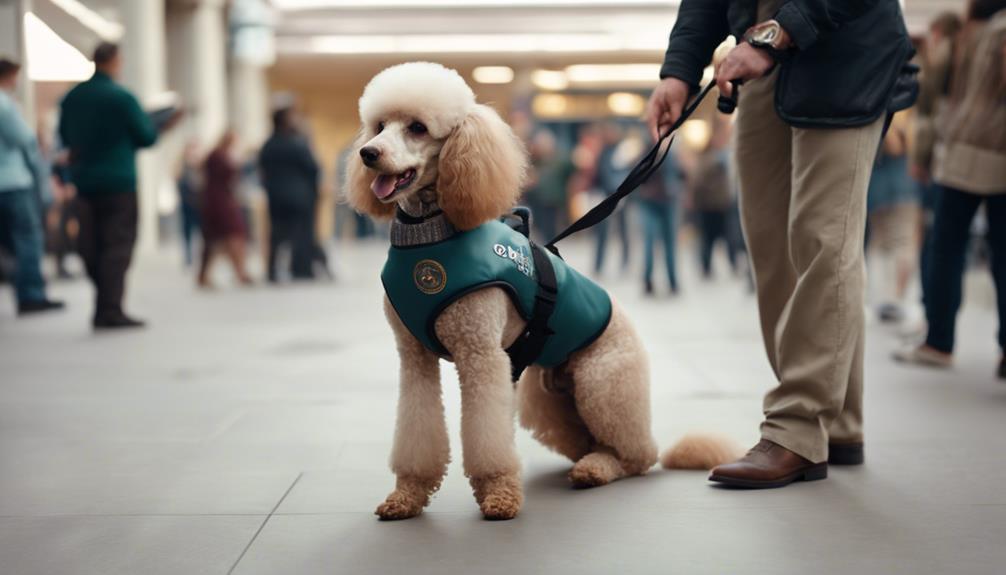
Extensive training is essential for service dogs to effectively perform specific tasks for individuals with disabilities. Trained service dogs undergo rigorous programs that encompass obedience training, task-specific skills, and public behavior. These programs focus on honing the dog's ability to assist their handler efficiently. Service dog training involves teaching the dog to respond reliably to various cues and commands, ensuring they can provide the necessary support when needed. The goal of service dog training is to establish a strong bond between the dog and their handler, enhancing the effectiveness of their partnership. Despite the challenges, service dogs are generally easy to train due to their intelligence, willingness to learn, and strong desire to please their handlers. Through structured training regimens, service dogs develop the skills and behaviors required to fulfill their roles effectively, ultimately making a significant difference in the lives of individuals with disabilities.
Training Requirements for Therapy Dogs
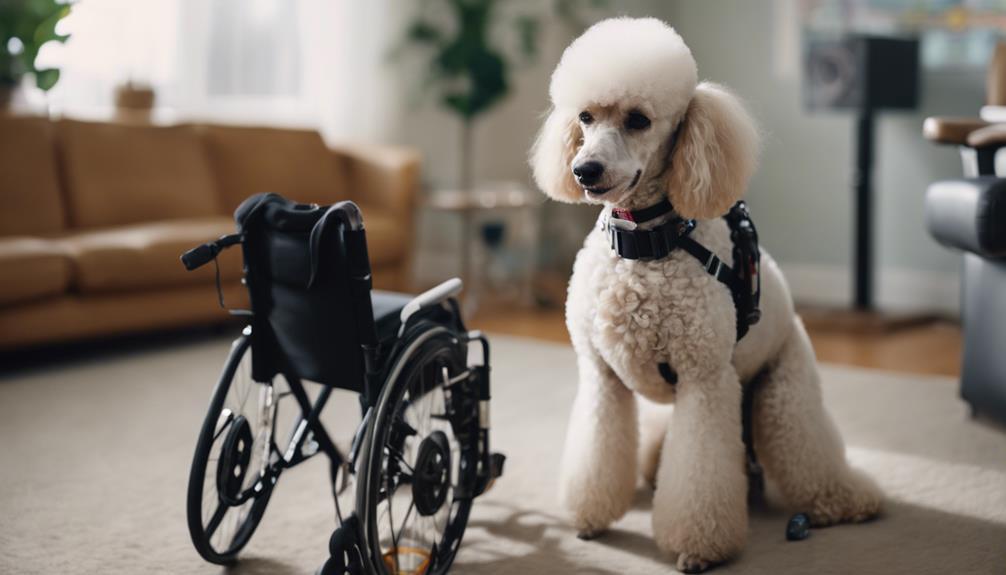
To effectively prepare therapy dogs for their role in providing comfort and support in therapeutic environments, specialized training is essential. Training requirements for therapy dogs differ from those of service animals, focusing more on providing emotional support rather than specific tasks. Here are some key aspects of training for therapy dogs:
- Socialization: Therapy dogs need to be comfortable and well-socialized in various environments and with diverse groups of people to ensure they can interact positively during therapy sessions.
- Basic Obedience: Training includes commands like sit, stay, come, and leave it, which are essential for maintaining control and ensuring the safety of both the dog and the individuals they are assisting.
- Therapy-Specific Skills: Dogs are trained to remain calm in challenging situations, provide gentle interactions, and offer comfort without being disruptive, all while being attentive to their handler's cues.
Suitability of Poodles for Service Work

Poodles' exceptional intelligence and trainability position them as one of the top breeds for service work. Their hypoallergenic coat and non-shedding characteristics cater to individuals with allergies, enhancing their suitability for service tasks. The versatility and adaptability of Poodles make them well-equipped to excel in various service roles and environments.
Poodle Attributes for Service
With their exceptional intelligence, trainability, and hypoallergenic coat, poodles rank among the top breeds for service work, showcasing their suitability for a variety of tasks. Poodles are highly intelligent working dogs, making them adept at learning complex tasks and problem-solving. Their hypoallergenic coat is a significant advantage for individuals with allergies, allowing for close interaction without triggering allergic reactions. Poodles excel in tasks like scent training, diabetic alerting, and light mobility work, highlighting their versatility for service roles. Their focused and attentive nature enables them to perform tasks requiring precision and reliability efficiently. Poodles' adaptability to various disabilities and their ability to form strong bonds with handlers make them ideal for service work, providing invaluable assistance and support.
Training Poodles Effectively
Ranked among the top 3 breeds for service work, poodles showcase exceptional intelligence, trainability, and a hypoallergenic coat that make them highly suitable for a variety of tasks. Their intelligence allows them to grasp commands quickly, making training efficient. However, their intense focus, known as 'poodle focus,' can sometimes pose a challenge when trying to redirect their attention during training sessions. Consistent and structured training routines are key to harnessing their potential effectively. Below is a table illustrating key aspects of training poodles for service roles:
| Training Aspect | Importance |
|---|---|
| Consistency | Crucial |
| Positive Reinforcement | Effective |
| Socialization | Fundamental |
| Mental Stimulation | Essential |
Poodle Service Dog Success
What makes poodles excel in service dog roles beyond their intelligence and trainability? Poodles were originally bred to retrieve waterfowl, showcasing their natural aptitude for assisting humans. When it comes to serving as a Psychiatric Service Dog, poodles bring a unique set of qualities to the table:
- Hypoallergenic Coat: Standard Poodles do not shed, making them ideal for individuals with allergies who rely on service dogs.
- Versatile Sizes: Poodles come in various sizes, offering flexibility for different service roles and individual needs.
- Adaptability: Their ability to adjust to different environments and tasks makes poodles well-suited for the diverse responsibilities of a service dog.
Suitability of Poodles for Therapy Work

Poodles' suitability for therapy work stems from their empathetic nature and keen sensitivity to human emotions. Their ability to excel in tasks related to therapy work, such as providing comfort and support to individuals in distress, makes them ideal for this role. Poodles' calm and gentle temperament allows them to effectively offer emotional support to those in need. Their intelligence and adaptability further enhance their capacity for therapy work as they can be trained for specific tasks tailored to individual requirements. Additionally, the versatility of poodles in terms of different sizes enables them to work in various settings and with diverse populations. Below is a table summarizing the key attributes of poodles that make them suitable for therapy work:
| Attribute | Description |
|---|---|
| Empathetic Behavior | Sensitivity to human emotions |
| Calm and Gentle | Temperament conducive to providing emotional support |
| Intelligent and Adaptable | Ability to learn and perform specific therapy tasks |
| Versatile Sizes | Suitable for various settings and populations |
Differences Between Service and Therapy Dogs
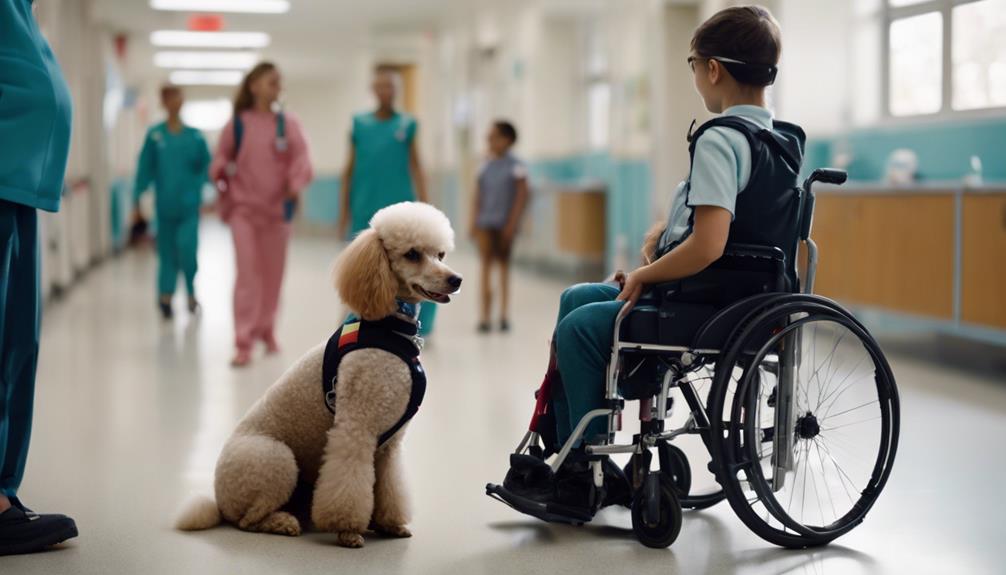
Service dogs and therapy dogs serve distinct roles in assisting individuals, each with specific training and access rights. Service dogs are trained to perform tasks that aid disabled individuals in leading a more independent life, such as guiding the blind or alerting to seizures. On the other hand, therapy dogs are not classified as service dogs but are trained to provide comfort and support in settings like hospitals and therapy sessions.
- Service Dogs:
- Trained to assist disabled individuals with specific tasks.
- Have mandatory access rights allowed everywhere by federal law.
- Perform tasks like guiding the blind and alerting to seizures.
These differences extend to their access rights as well. Service dogs are legally permitted to accompany their handlers in all public places, including those where pets are not typically allowed. Conversely, therapy dogs may have restricted access, as their presence is not guaranteed by law in the same way as service dogs.
Specialized Tasks for Poodle Service Dogs
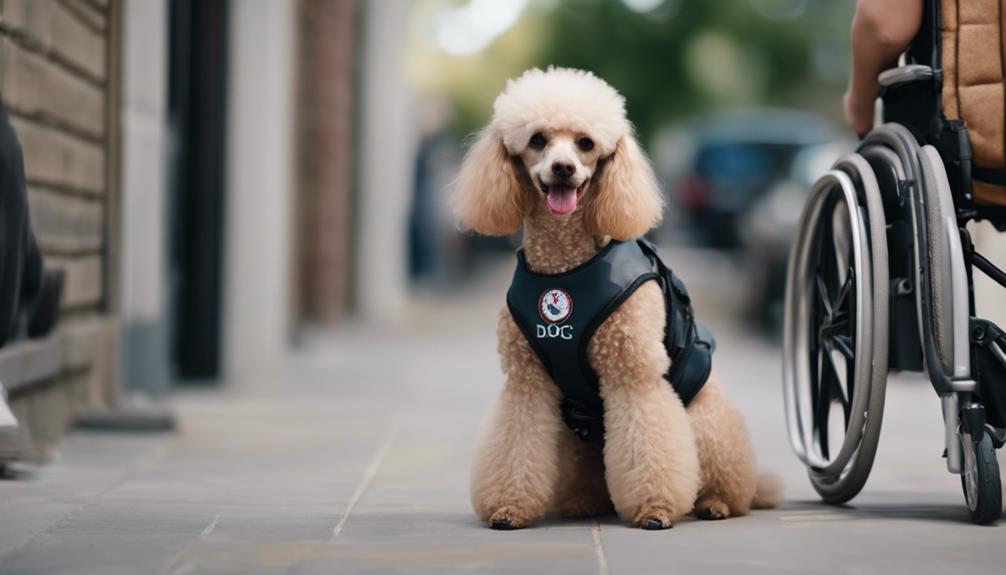
Transitioning from the discussion on the differences between service and therapy dogs, the specialized tasks that poodle service dogs are trained for encompass a wide range of crucial roles in assisting individuals with various needs. Poodle service dogs are highly skilled in performing tasks that cater to specific requirements, making them invaluable assets in service settings. The table below illustrates some of the specialized tasks that poodle service dogs can be trained to undertake:
| Specialized Task | Description | Importance |
|---|---|---|
| Diabetic Alerting | Poodles can be trained to detect changes in blood sugar levels and alert their handlers. | Vital for managing diabetes effectively. |
| Mobility Assistance | These dogs assist individuals with mobility issues by providing support and stability. | Enhances independence and daily functioning. |
| Seizure Detection | Poodle service dogs can alert their handlers before the onset of a seizure. | Helps ensure timely medical intervention. |
Poodle service dogs exhibit exceptional abilities in fulfilling these specialized tasks, showcasing their adaptability and dedication to serving those in need.
Emotional Support Poodles

Emotional support Poodles offer valuable companionship and comfort to individuals facing emotional distress or mental health challenges. These furry companions may not have the same public access rights as service dogs, but they play a crucial role in improving their owner's overall well-being and mental health. Here are some key points about emotional support Poodles:
- Emotional Comfort: Emotional support Poodles are adept at providing emotional comfort and support to their owners during times of distress or anxiety.
- Alleviating Symptoms: They can help alleviate symptoms of anxiety and depression through their calming presence and affectionate nature.
- Reducing Loneliness: Emotional support Poodles help reduce feelings of loneliness and isolation by being loving and intuitive companions.
While emotional support Poodles do not require the extensive training that service dogs do, their ability to empathize and offer unconditional love makes them invaluable allies in supporting individuals' mental health and emotional well-being.
Certifications and Registrations for Poodles
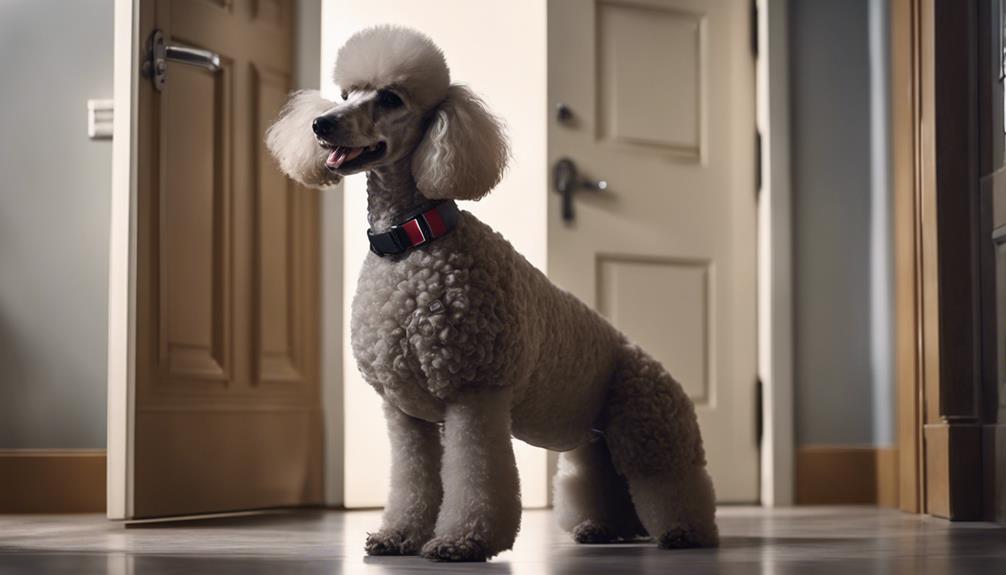
Therapy and service dog certifications and registrations are essential for ensuring that Poodles are well-trained and capable of providing assistance or comfort to individuals in need. Certifications for therapy dogs can include Canine Good Citizen (CGC), Therapy Dog International (TDI), and Alliance of Therapy Dogs (ATD). These certifications often require passing a temperament test, health checks, and evaluations for behavior around people and other animals. On the other hand, service dog certifications typically involve completing a training program, passing a public access test, and demonstrating specific task training related to the handler's disability. Organizations like Assistance Dogs International (ADI) or International Association of Assistance Dog Partners (IAADP) may issue certifications for service dogs. Both therapy and service dog certifications aim to ensure that the Poodles are well-behaved and capable of providing the needed assistance or comfort. It is through these certifications and training programs that Poodles can fulfill their roles effectively as therapy and service dogs.
Conclusion: The Impact of Poodles
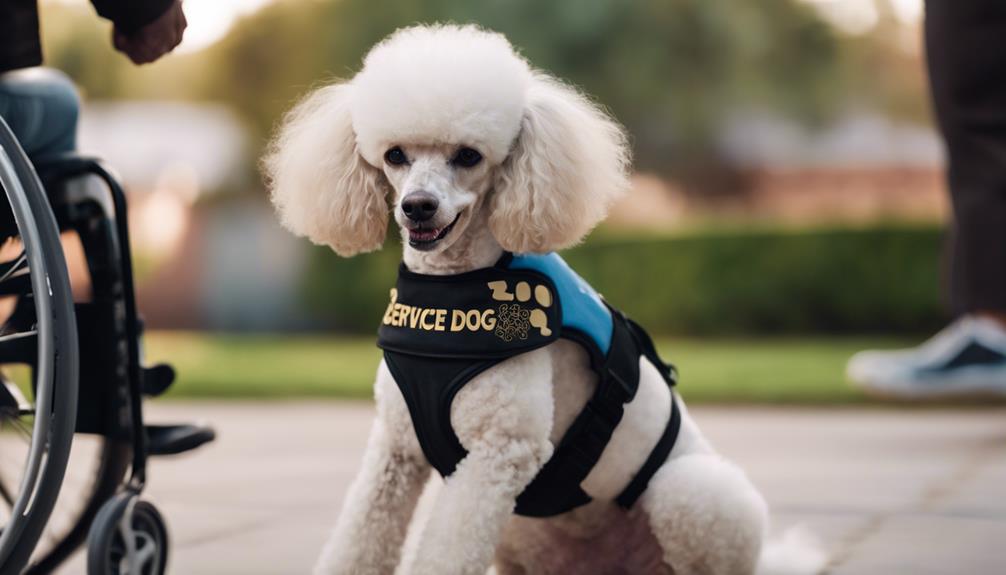
With their intelligence, adaptability, and range of abilities, Poodles have undeniably left a lasting impact as therapy and service dogs. Their exceptional qualities enable them to excel in various roles, benefiting both individuals in need and the broader community. Here are some key ways in which Poodles have made a significant impact:
- Versatility: Poodles' versatility in different sizes allows them to cater to a wide range of needs in therapy and service dog roles, making them adaptable to various tasks and environments.
- Allergy-Friendly: Their hypoallergenic coats make them suitable for individuals with allergies in therapy and service settings, ensuring that more people can benefit from their assistance without concerns about allergic reactions.
- Strong Bonds: Poodles' friendly and loyal nature enables them to form strong bonds with their handlers, enhancing their effectiveness in providing assistance and support in a profound and meaningful way.
Frequently Asked Questions
Why Are Poodles Good Therapy Dogs?
Poodles make excellent therapy dogs due to their empathetic nature, providing comfort and support to those in need. Their training techniques focus on enhancing emotional support skills, benefiting individuals with anxiety or PTSD.
What Is the Best Poodle Mix for a Therapy Dog?
For a therapy dog, the best Poodle mix could be a Goldendoodle, a labradoodle hybrid breed known for its friendly nature. Before choosing, assess temperament, consider training techniques, and evaluate compatibility for therapy tasks.
Are Poodles Good for People With Anxiety?
Yes, poodles are good for people with anxiety. Their empathetic nature and calm demeanor provide excellent emotional support and companionship. These qualities make them ideal support animals for promoting mental health and well-being.
What Are the Pros and Cons of Poodles?
In considering poodles, you'll find pros like intelligence, versatility, and adaptability for service tasks. However, grooming demands and slower maturation can be cons. Addressing quirks and sensitivities is crucial for their success as service animals.
Conclusion
In conclusion, Poodles symbolize the perfect blend of intelligence, empathy, and adaptability when it comes to serving as therapy and service dogs. Their history and physical characteristics make them ideal for a variety of roles, from assisting individuals with disabilities to providing emotional support. With proper training and certifications, Poodles have a profound impact on the lives of those in need, showcasing their ability to truly connect and make a difference.
